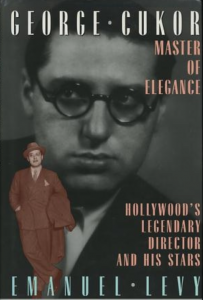Produced by the estimable Arthur Hornblow, Jr., before iot began shooting Desire Me was touted as Metro’s most important production of the year.
George Cukor got to work with Louis B.’s favorite actress at the time, Greer Garson. Louis B. told Cukor that Garson desperately needed a hit after “Adventure,” her disastrous flop with Clark Gable.
My Biography of George Cukor, 1994.
This put an additional pressure on Cukor, who, from the start, didn’t like the project or the actress, whom he found to be stiff, stately, and humorless. (Cukor had never worked with her though both were under contract to the same studio).
Cukor began to work with Casey Robinson’s muddled script, first titled “Sacred and Profane,” then changed to “Karl and Anna.”
Three usually reliable women, Zoe Akins, Marguerite Roberts, and Sonya Levien, then tried to revamp the screenplay, changing its name to the vapid Desire Me.
A dreary melodrama, it’s the story of a Normandy villager’s wife (Garson) who, after hearing that her husband (Robert Mitchum) has died in a concentration camp, marries his best friend (Richard Hart). The complications begin when the bearer of news turns out to be psychotic and the presumably dead husband comes home.
The Brittany sequences were shot in California’s picturesque Monterey. Along that eighteen miles of the rock-studded coast, a crew of 150 people worked for 16 weeks. A whole French village was erected, including a city hall, a tobacco shop and wine inn. Treating it as an epic film, permission was obtained for school children to appear in the crowd scenes–a school was set up on location for classes between takes–and servicemen from a nearby military base were used as French soldiers.
“Desire Me” was a troubled production from the get-go. First, Richard Hart, a new recruit from the New York theater, replaced Robert Montgomery, who walked out soon after shooting began. Cukor thought thar Hart was handsome but had no talent or charm, but the actor was imposed on him by Hornblow.
Worst yet, Hornblow, who didn’t get along with Cukor, put pressure to use Robert Mitchum, then an emerging star, as Garson’s husband. Impatient at the numerous rewrites and constant reshooting of scenes, the cool Mitchum began to clown it up, incurring Cukor’s wrath. Cukor thought Mitchum was a lazy actor, because he treated the film with irreverence. For his part, Mitchum complained that he was forced to act like a Shakespearean actor.
On April 20, 1946, a bad accident occurred when Garson was swept out to sea by a huge wave. Taken to the hospital, she suffered cuts on her arms and stomach, torn on the razor-like rocks. Interestingly, the cameras kept rolling throughout the rescue episode, recording the entire incident.
Cukor could not conceal his contempt for the material and demanded to be replaced. Desire Me was finally taken away from him, when Hornblow looked at the rushes. The film was then reshot by two MGM directors, Mervyn LeRoy and Jack Conway.
Cukor directed about half of the film, but in the end, no credit was given to any director. Neither Cukor nor the other directors wanted any screen credit. Desire Me may be the only Hollywood feature to be released without a directorial credit. To Cukor’s embarrassment, his name appeared on some of the film’s prints in England, despite the fact that he had disowned it.
“Whenever a picture doesn’t turn out,” Cukor once said, “the studio assumes that it is the director’s fault. I was put off, because the front office blamed everything on me.” After his dismissal, Cukor showed up at MGM, but some people did not speak to him. “Now I know who will come to my funeral,” he said to himself.
In December 1946, a preview of Desire Me proved to be a disaster. “Much to my disappointment,” Mitchum later recalled, “the audience didn’t seem to like it.” After the first reel, when many viewers left, Mitchum put his collar up and sneaked out himself. The preview audience found the film poorly motivated and full of cutbacks. Some sequences were then reshot and the film was finally released in September 1947, a year and half after production began.
Cukor would have several failures in his five-decade career, though none as embarrassing as Desire Me. But he was a real survivor. As often happens in Hollywood, in 1948, Cukor was asked to replace Mervyn LeRoy on Selznick’s remake of “Little Women,” which he refused. When LeRoy showed signs of depression, Cukor told him: “I was put off GWTW, maybe the biggest movie ever made, and I’m still here to tell the tale; so don’t despair.” His motto continued to be: “You must have faith in yourself and keep going.”
Indeed, Cukor kept going on and his next film, “A Double Life,” turned out to be a major success, earning several Oscar nominations and awards.











